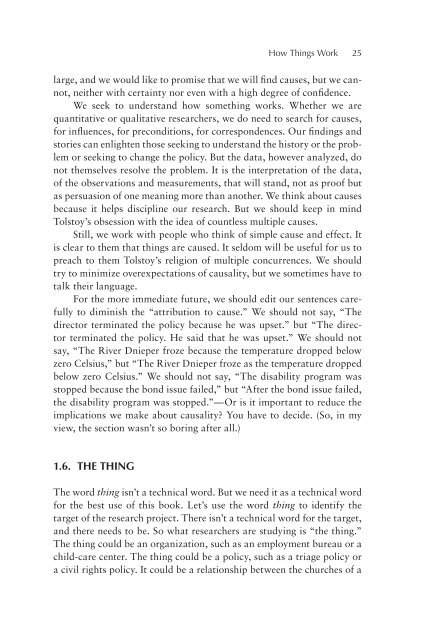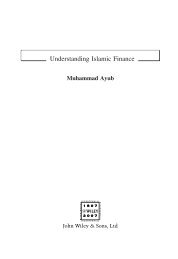How Things Work - Doha Academy of Tertiary Studies
How Things Work - Doha Academy of Tertiary Studies
How Things Work - Doha Academy of Tertiary Studies
Create successful ePaper yourself
Turn your PDF publications into a flip-book with our unique Google optimized e-Paper software.
<strong>How</strong> things <strong>Work</strong> 25<br />
large, and we would like to promise that we will find causes, but we cannot,<br />
neither with certainty nor even with a high degree <strong>of</strong> confidence.<br />
We seek to understand how something works. Whether we are<br />
quantitative or qualitative researchers, we do need to search for causes,<br />
for influences, for preconditions, for correspondences. Our findings and<br />
stories can enlighten those seeking to understand the history or the problem<br />
or seeking to change the policy. But the data, however analyzed, do<br />
not themselves resolve the problem. It is the interpretation <strong>of</strong> the data,<br />
<strong>of</strong> the observations and measurements, that will stand, not as pro<strong>of</strong> but<br />
as persuasion <strong>of</strong> one meaning more than another. We think about causes<br />
because it helps discipline our research. But we should keep in mind<br />
Tolstoy’s obsession with the idea <strong>of</strong> countless multiple causes.<br />
Still, we work with people who think <strong>of</strong> simple cause and effect. It<br />
is clear to them that things are caused. It seldom will be useful for us to<br />
preach to them Tolstoy’s religion <strong>of</strong> multiple concurrences. We should<br />
try to minimize overexpectations <strong>of</strong> causality, but we sometimes have to<br />
talk their language.<br />
For the more immediate future, we should edit our sentences carefully<br />
to diminish the “attribution to cause.” We should not say, “The<br />
director terminated the policy because he was upset.” but “The director<br />
terminated the policy. He said that he was upset.” We should not<br />
say, “The River Dnieper froze because the temperature dropped below<br />
zero Celsius,” but “The River Dnieper froze as the temperature dropped<br />
below zero Celsius.” We should not say, “The disability program was<br />
stopped because the bond issue failed,” but “After the bond issue failed,<br />
the disability program was stopped.”—Or is it important to reduce the<br />
implications we make about causality? You have to decide. (So, in my<br />
view, the section wasn’t so boring after all.)<br />
1.6. the thiNG<br />
The word thing isn’t a technical word. But we need it as a technical word<br />
for the best use <strong>of</strong> this book. Let’s use the word thing to identify the<br />
target <strong>of</strong> the research project. There isn’t a technical word for the target,<br />
and there needs to be. So what researchers are studying is “the thing.”<br />
The thing could be an organization, such as an employment bureau or a<br />
child-care center. The thing could be a policy, such as a triage policy or<br />
a civil rights policy. It could be a relationship between the churches <strong>of</strong> a

















